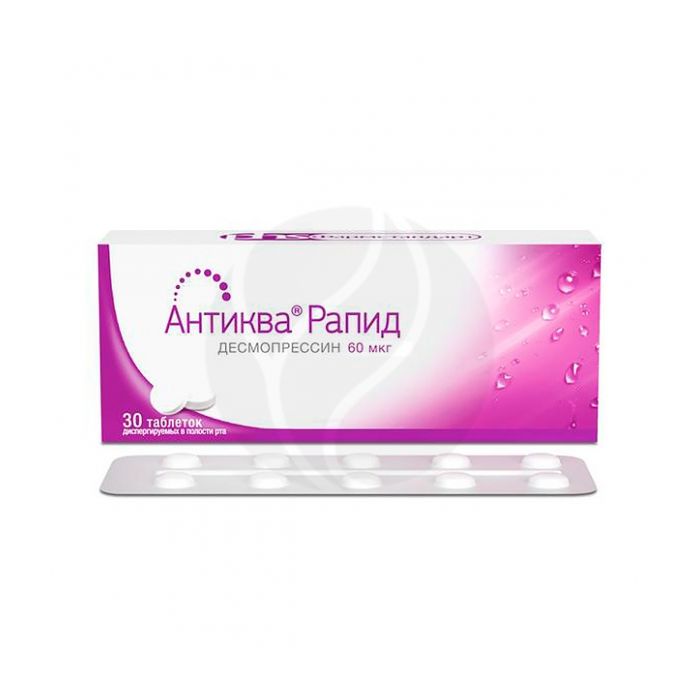Antiqua Rapid dispersible tablets 60mkg, No. 30
Expiration Date: 11/2025
Russian Pharmacy name:
Антиква Рапид таблетки диспергируемые 60мкг, №30
Diagnosis and treatment of diabetes insipidus;
treatment of temporary polyuria and polydipsia after operations in the pituitary gland (only for intranasal use);
bedwetting (both as monotherapy and as part of complex therapy).
As a diagnostic tool for determining the concentration of the kidneys.
Inside, keep in mouth until completely dissolved.
Oral dispersible tablets should not be handled with wet hands. the tablet may begin to dissolve.
Do not take a tablet with liquid!
The optimal dose of AntiquaЃ Rapid is selected individually.
Tablets dispersed in the oral cavity are white or almost white, round, biconvex.
Active ingredient: desmopressin -60 mcg
Excipients: sodium stearyl fumarate, mannitol, croscarmellose sodium
Congenital or psychogenic polydipsia
anuria,
fluid retention of various etiologies,
plasma hypoosmolality,
heart failure and other conditions that require diuretic therapy,
hypersensitivity to desmopressin.
pharmachologic effect
Synthetic analogue of vasopressin. It has a pronounced antidiuretic effect. Compared with vasopressin, it affects the smooth muscles of blood vessels and internal organs to a lesser extent. In diabetes insipidus, it enhances the reabsorption of water from the distal tubules of the kidneys, while increasing the relative osmotic density of urine. This helps to reduce the frequency of urination and eliminate the increased need for fluid.
Desmopressin activates blood coagulation factor VIII and increases the level of plasma plasmin activator. Being a polypeptide, it is destroyed by digestive enzymes of the gastrointestinal tract.
Pharmacokinetics
Desmopressin is destroyed in the digestive tract. After intranasal administration, absorption is 10-20%. Cmax of the active substance in plasma is reached after 0.5-4 hours. It is metabolized in tissues. T1 / 2 in the initial phase - 8 minutes, in the final phase - 75 minutes.
Side effect
From the side of the central nervous system: headache, dizziness, impaired consciousness, coma.
From the digestive system: intestinal colic, nausea, vomiting.
From the side of the cardiovascular system: a moderate increase in blood pressure (when used in high doses), arterial hypotension (with rapid intravenous administration).
From the respiratory system: rhinitis, swelling of the nasal mucosa.
From the urinary system: oliguria.
From the side of metabolism: water retention in the body, hyponatremia, hypoosmolality, weight gain.
From the endocrine system: algodismenorrhea.
From the side of the organ of vision: disorders of lacrimation, conjunctivitis.
Allergic reactions: skin rash.
Application during pregnancy and lactation
There have been no adequate and well-controlled studies of the safety of desmopressin during pregnancy and lactation. If it is necessary to use desmopressin in this category of patients, the expected benefits of therapy for the mother and the possible risk for the fetus or child should be weighed.
Application for impaired renal function
Desmopressin is prescribed with caution for impaired renal function.
Application in children
In order to avoid volume overload when prescribing desmopressin, special monitoring of the condition is necessary in children and adolescents. Application for the study of the concentration ability of the kidneys in children under the age of 1 year should be carried out only in a hospital setting.
Use in elderly patients
In order to avoid volume overload when prescribing desmopressin, special monitoring of the condition is necessary in the elderly.
special instructions
With edema of the nasal mucosa, severe rhinitis, a violation of the absorption of desmopressin with intranasal administration is possible. In such cases, sublingual administration is recommended.
In order to avoid volume overload when prescribing desmopressin, special monitoring of the condition is necessary in patients of the following groups: children and adolescents, the elderly, persons with impaired water and / or electrolyte balance, persons at risk of increased intracranial pressure. It is prescribed with caution in case of impaired renal function, cardiovascular diseases, fibrosis of the bladder.
When using desmopressin as a diagnostic agent, as well as with intravenous administration of repeated doses, forced hydration (orally or parenterally) should not be performed, the patient should take as much fluid as is required to quench his thirst.
Application for the study of the concentration ability of the kidneys in children under the age of 1 year should be carried out only in a hospital setting.
Drug interactions
Indomethacin can increase the intensity (but not the duration) of the action of desmopressin. Drugs that have the ability to increase the release of ADH (including tricyclic antidepressants, chlorpromazine, carbamazepine) can cause an additive antidiuretic effect, which increases the risk of fluid retention.

